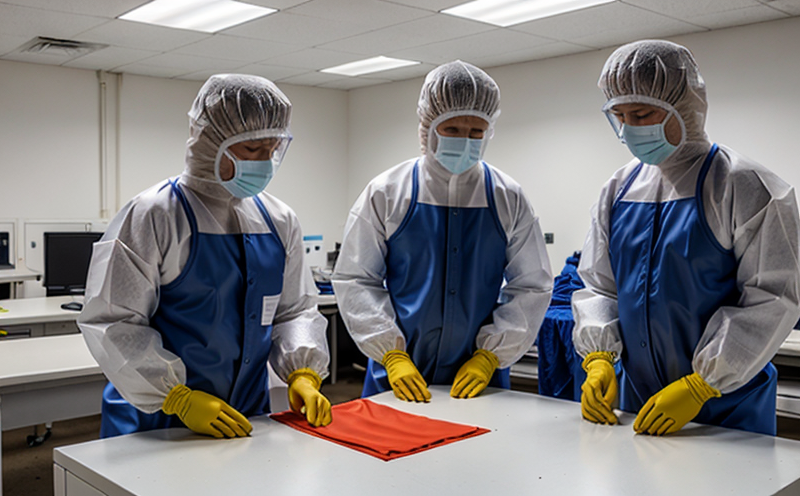ASTM F3003 Protective Clothing Infectious Disease Resistance Testing
The ASTM F3003 standard is designed to evaluate the resistance of protective clothing to infectious agents, ensuring that workers in high-risk environments are protected from potential exposure. This testing is crucial for industries where occupational safety and health are paramount, such as healthcare, pharmaceuticals, and emergency response.
The ASTM F3003 test involves subjecting a sample of the protective clothing to aerosolized infectious agents under controlled conditions. The goal is to determine if the fabric can prevent the penetration of these agents through any breaches in the material or seams. This standard applies particularly to materials used in environments where there is an elevated risk of airborne transmission, such as during outbreaks of diseases like Ebola or SARS.
The test setup typically involves a specialized chamber that simulates real-world conditions. The clothing sample is placed in this chamber and exposed to the infectious agent aerosols for a specified duration. After exposure, the integrity of the fabric is assessed by checking for any breaches using both visual inspection and microbiological testing.
One of the key aspects of ASTM F3003 is its focus on real-world relevance. It takes into account various factors that might affect the performance of protective clothing in actual use, such as the type of infectious agent, the environmental conditions, and the specific design and manufacturing process of the garment.
The acceptance criteria for this test are stringent to ensure the highest level of protection. The fabric must demonstrate no penetration by the infectious agents under the specified exposure parameters. This is measured both visually and through microbiological testing, which involves culturing any material that passes through the fabric to detect viable pathogens.
Understanding the implications of this test for different industries can provide a deeper insight into its importance. For instance, in healthcare settings, where workers are exposed to various infectious diseases, the integrity of their protective clothing is critical. Similarly, in emergency response operations, the ability of protective gear to withstand harsh environmental conditions and potential breaches is essential.
The ASTM F3003 standard is part of a broader suite of tests that ensures the safety and efficacy of protective equipment used by workers in high-risk environments. By adhering to this standard, manufacturers can ensure their products meet or exceed the necessary safety requirements, thereby protecting both the workers and the public.
Applied Standards
| Standard | Description | Relevant Parameters |
|---|---|---|
| ASTM F3003-19 | Determination of resistance to penetration by infectious agents. | Aerosolized infectious agent exposure, visual inspection, microbiological testing. |
| ISO 16811:2014 | Performance and classification of protective clothing for workers exposed to biological hazards. | Resistance to penetration by infectious agents, chemical resistance. |
Quality and Reliability Assurance
The ASTM F3003 testing process is designed with quality and reliability in mind. The first step involves selecting high-quality samples that accurately represent the protective clothing being tested. These samples are prepared following strict protocols to ensure consistency across multiple tests.
During the test, environmental conditions such as temperature and humidity are carefully controlled to mimic real-world scenarios. This ensures that the results obtained are reliable and can be trusted for decision-making purposes. After exposure to the infectious agents, any breaches in the fabric are inspected visually, which is a critical step in ensuring the integrity of the protective clothing.
The microbiological testing component further reinforces the reliability of the results. This involves culturing any material that passes through the fabric and identifying viable pathogens. The presence or absence of these pathogens directly impacts the classification and certification of the protective clothing, ensuring it meets the stringent requirements set forth by ASTM F3003.
The data collected from these tests is thoroughly analyzed to ensure compliance with all relevant standards. This includes not only the visual inspection but also the microbiological testing results. The analysis process is meticulous and involves multiple layers of review to minimize errors and ensure accuracy.
In addition to the testing itself, the quality assurance program extends to the entire lifecycle of the protective clothing. From design and manufacturing to final certification, every step is meticulously monitored and documented. This comprehensive approach ensures that the products meet or exceed the necessary safety requirements, providing peace of mind for both manufacturers and end-users.
Competitive Advantage and Market Impact
The ASTM F3003 testing process is not just about compliance; it provides a significant competitive advantage in the market. By ensuring that their products meet or exceed the stringent requirements set by this standard, manufacturers can differentiate themselves from competitors. This is particularly important in industries where safety and health are paramount.
Customers, especially those in high-risk environments, trust brands that adhere to rigorous testing standards like ASTM F3003. This not only enhances brand reputation but also fosters customer loyalty. In the healthcare sector, for example, hospitals and clinics may prefer suppliers who can demonstrate a strong commitment to safety through compliance with these standards.
The market impact of adhering to this standard is profound. It opens up new markets and opportunities for growth. For instance, regions that are prone to outbreaks or epidemics may have stricter regulations and demand higher quality protective clothing. By meeting these standards, manufacturers can tap into these emerging markets and expand their customer base.
The ASTM F3003 testing process also contributes to the overall safety and well-being of workers across various industries. This has a positive ripple effect on society as a whole, reducing the risk of exposure to infectious diseases and promoting healthier work environments.





